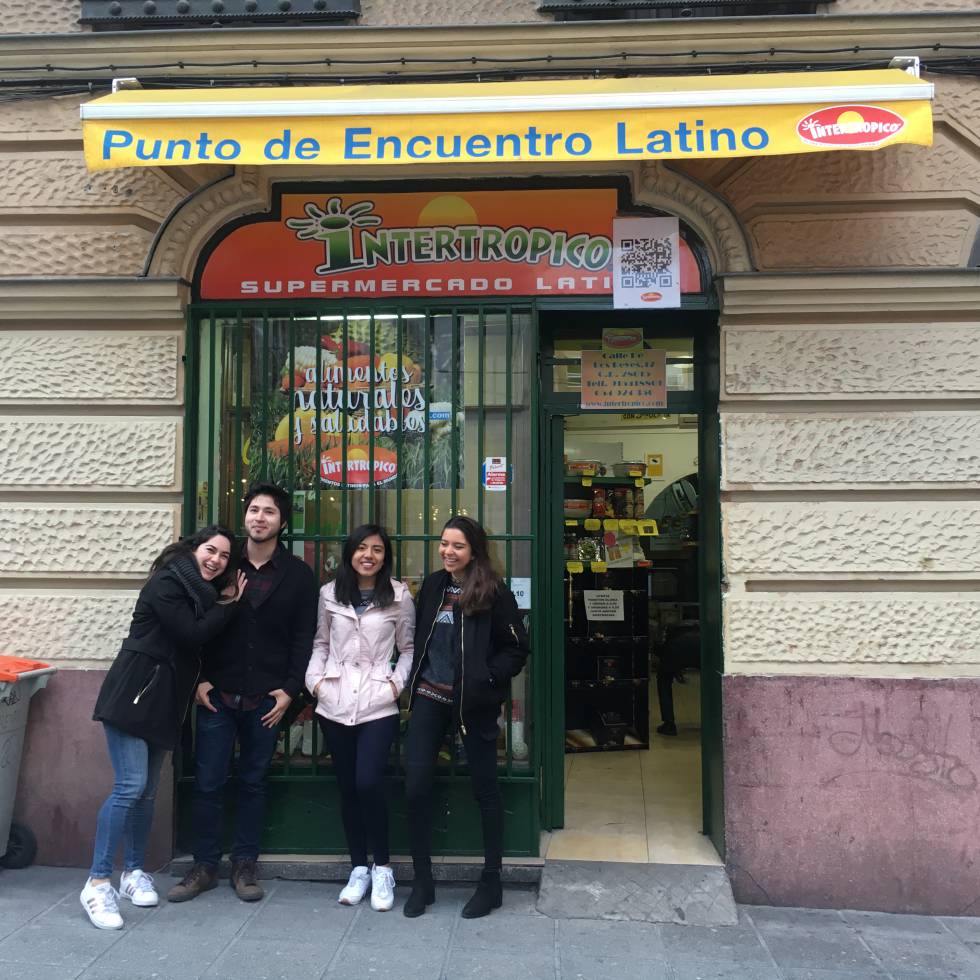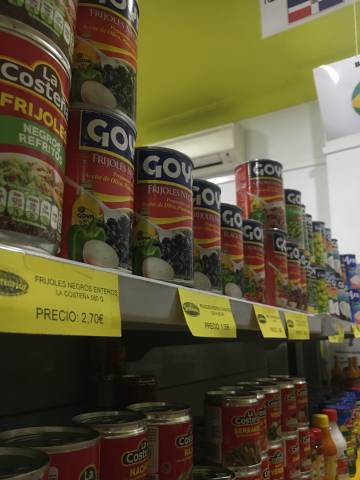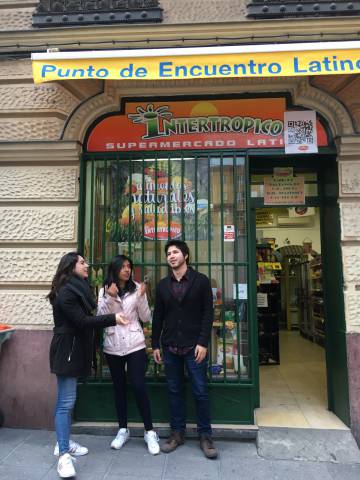How Latin American people are finding a new home in Spain
Students and immigrants from the region are building a new community thousands of miles away from home

Laura and friends from Mexico outside ‘Intertropico,’ a shop that imports food and products from all of Latin America.
Madrid
Spain is home to thousands of Latin American immigrants and visitors. Some have fled violence and crisis while others have simply chosen to study abroad. But while their reasons for being in Spain may vary, they have come together to build communities and continue their traditions from back home.

These communities have a particularly strong presence in Madrid, where you can find a bodega (a shop that specializes Latin American and Caribbean products) on almost every second street. In fact, just around the corner from the capital’s iconic Plaza de España square, where bronze sculptures of Don Quixote and Sancho Panza draw hundreds of tourists, is the bodega Intertropico.
María, a Colombian woman who works at the store, says the place is never without customers: “we’re always so busy here because so many people miss their products from home.” While she speaks, she arranges the trademark Colombian bon bon bum lollipops on the counter, a fierce rival to Spanish Chupa Chups.
As the daughter of Colombian immigrants, I am easily lured into Intertropico, drawn in by its salsa or reggaeton music, the enticing smell of the freshly-made empanadas and pan de bono (bread made with corn flour, cassava starch, cheese, and eggs), and the joy of hearing that all-too familiar greeting, “quiubo mi reina, a la orden amor,” (how are you my queen, at your service) as I walk in. It makes me feel like I’m back in my grandmother’s kitchen, smiling down at a plate of sobrebarriga y arróz (flank steak and white rice).
My cousins, who like me were born to Colombian parents, live in Barcelona and have mixed feelings about being the children of Latin American immigrants. When asked about how they identify, they answer everything from Catalan, to Latino, to my personal favorite, “citizens of the world.” I appreciate the conflict. Since arriving in Spain, there have been days where I wake up feeling the pull of my Latino roots and others were I go to bed thinking in English about how I’ll always consider my birthplace, New York, as the greatest city in the world.

But for Ingrid Ling the experience of moving to Spain from Costa Rica hasn’t been so difficult: “I think I’ve overcome all the obstacles in my way,” she says. After finishing her master’s degree in Madrid, Ling began working in project management and planning at a wind power company. When she was offered the opportunity to stay longer, she “didn't have to think twice about it.”
Monica Kareen Claros Cadima from Bolivia worked incredibly hard to continue her studies in Spain. “In Bolivia, I had two university degrees and a master's, I had worked my way up to a managing position at Toyosa [an automotive company] and I left it all to start over as a student again here in Madrid,” she says. I was perplexed at her reasons for leaving. She explained that “ideas are so different here, and so is the working style. I’m not in a rush to go back home, I want to go back with these new ideas eventually, but right now I’m here to learn.”
But being a non-resident in Spain has its own set of challenges – particularly when it comes to health care. Monica suffers from hyperthyroidism,“it’s something I’ve had for years,” she says, “and now my doctors want me to get a thyroid-stimulating hormone exam, but my insurance doesn’t cover it.” Her doctor suggested the treatment over five months ago.
Spain in general is one of the friendliest places to move to if you’re LatinaINGRID LING FROM COSTA RICA
Students like Monica are considered tourists when it comes to registering for social security, making it almost impossible to freely access medical treatment. “The doctor told me to double my usual dosage,” says Monica, “but since I don’t have access to the medicine, I’ve had to wait until friends or relatives come visit me from Bolivia, and no one has come yet.” She needs an employer to provide insurance coverage, but it is difficult to find work since “no one wants to hire someone who may leave in three months.”

When I asked Ingrid and Monica if they missed certain things from home, or “the cheap supermarket prices and spice in their foods,” as Monica put it, Ingrid was firm: “I think that Spain in general is one of the friendliest places to move to if you’re Latina, there’s just such a synchronized rhythm, and life is so good here, at least it has been for me. Spaniards have such a similar culture to our own, the contrast isn’t so stark.”
These experiences do not represent all of the hardships Latin American people in Spain endure, but they do show how even thousands of miles away you can still find pieces of home, be it in a song or your favorite bodega.





































No hay comentarios:
Publicar un comentario